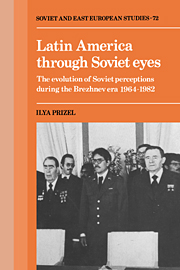 Latin America through Soviet Eyes
Latin America through Soviet Eyes Book contents
- Frontmatter
- Contents
- Preface
- Acknowledgments
- Introduction
- Part I Soviet perceptions of Latin America's global role
- Part II Soviet perceptions of Latin American social structures
- Part III Soviet–Latin American relations during the Brezhnev era
- Introduction
- 11 Case study: Mexico
- 12 Case study: Chile
- 13 Case study: Brazil and Argentina
- Part IV Conclusion: the emerging Soviet perception of Latin America and the future of Soviet policy toward the hemisphere
- Conclusions
- Epilogue – Latin America: the Long March
- Notes
- Bibliography
- Index
- Frontmatter
- Contents
- Preface
- Acknowledgments
- Introduction
- Part I Soviet perceptions of Latin America's global role
- Part II Soviet perceptions of Latin American social structures
- Part III Soviet–Latin American relations during the Brezhnev era
- Introduction
- 11 Case study: Mexico
- 12 Case study: Chile
- 13 Case study: Brazil and Argentina
- Part IV Conclusion: the emerging Soviet perception of Latin America and the future of Soviet policy toward the hemisphere
- Conclusions
- Epilogue – Latin America: the Long March
- Notes
- Bibliography
- Index
Summary
Chile was always different from the rest of Latin America. Unlike much of the continent, Chile enjoyed a relatively enduring democracy and had a highly developed and politically active working class. In contrast with much of Latin America, where the communist parties rarely amounted to any more than political fringe groups, the communist party of Chile (PCCh) had been a significant factor in Chilean politics since the 1920s and had collaborated with the armed forces during the existence of the short-lived Chilean “socialist republic” in 1931. Aside from the Cuban communist party, which had joined the Batista government in 1942, the PCCh was the only other communist party in Latin America to have participated in a government during the “popular front” era. In addition, although most Latin American communist parties had lost their control over the labor movement by the early 1950s, the PCCh retained its control over the country's largest trade union until the 1973 coup.
Chile established diplomatic relations with the USSR in 1944. In 1946 Gabriel González Videla was elected to the presidency with the support of the communists, several of whom were awarded seats in the cabinet. The following year, as a result of the deepening cold war, Chile broke diplomatic relations with the USSR and outlawed the PCCh. Among the victims of this reversal were negotiations concerning the establishment of a regular ship link between Vladivostok and Valparaíso and barter agreements exchanging Chilean minerals for Soviet equipment.
- Type
- Chapter
- Information
- Latin America through Soviet EyesThe Evolution of Soviet Perceptions during the Brezhnev Era 1964–1982, pp. 160 - 167Publisher: Cambridge University PressPrint publication year: 1990
